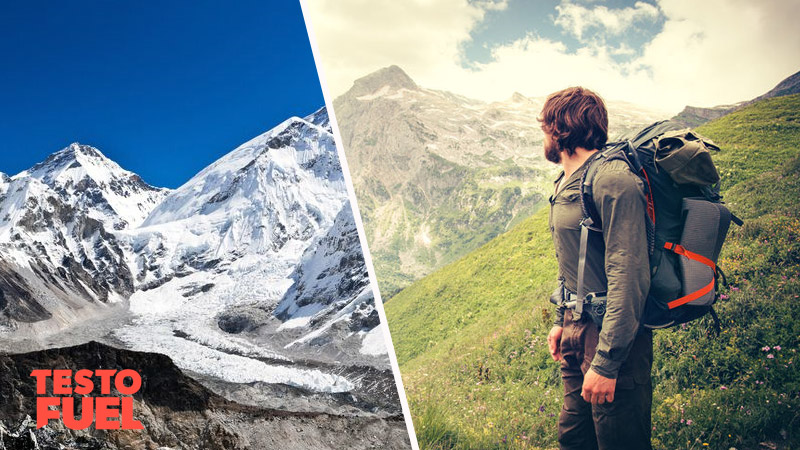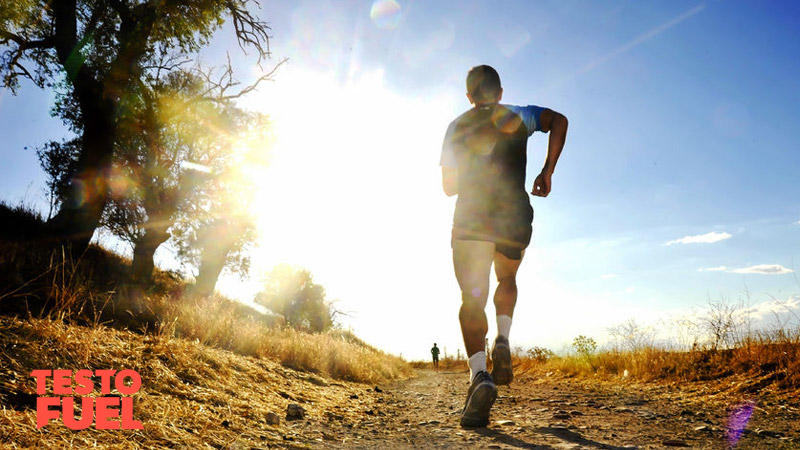TestoFuel Blog : Make Gains & Pack on the Muscle

Some people prefer to spend their leisure time reading a nice book with a hot cup of tea and some Schubert playing gently in the background.
Others prefer the more adrenaline-led approach to life. That means rock and roll and extreme sports such as snowboarding, abseiling and hang gliding.
And it doesn’t get much more extreme than outdoor mountain climbing.
So whilst traversing mountain ledges and facing sheer drops might get your adrenaline pumping; does it also boost testosterone?
In this article we take a look.
The primary sex hormone in men is called testosterone. It is a naturally occurring steroid which is synthesised from cholesterol.
It helps you develop and then regulate a number of male characteristics. These include anabolic traits such as muscle mass, strength and athleticism, as well as androgenic traits like hair growth and voice deepening.
Without it you wouldn’t be the masculine man you are now.
T is released into your bloodstream from the Leydig cells of your testes. And once there it is taken up by various tissues so that it can carry out it’s duties.
But the way in which it is signalled to be released is a little more complex:
T is not released in a constant flow. Instead it is ‘pulsed’ from your testes.
This is because when your body thinks there’s too much T it slows things down. And when there’s not enough it speeds up the release of the hormone.
Testosterone relies on signals being sent via the brain, your levels change throughout the day. They are usually highest in the morning and lower in the evening.
Although testosterone changes throughout the day, your serum levels should consistently fall between 300 – 1000 ng.dL. Measurements are usually taken in the morning.
If you drop under the 300 ng.dL lower limit then you would be diagnosed as having clinically low T – what’s known as hypogonadism.
A study published in Fertility and Sterility [1] wanted to explore the effects of high altitude climbing exercise on fertility and male reproductive health.
The research team, based at the University of L’Aquila, Italy, monitored a group of climbers as they trekked for a 3-week period in the Himalayas, Nepal.
During the climb, the group reached heights of just under 6,000 meters but didn’t use any extra oxygen. This meant they were reliant on the low oxygen saturated air of the mountain climate.
Ten days upon their return, the research team analyzed the blood of the climbers, looking for anything that might indicate a change to either fertility or male hormones.
Unsurprisingly, the climbers came back in much better shape than before. They had a better body composition, smaller waist circumference and lower body fat. On average their body fat reduced from 26 to 23%.
The trek will have been pretty brutal and required some hard exercise to complete.
Hormone levels had changed too. LH and FSH had increased. And this led to more stimulation of the Leydig cells and a higher concentration of testosterone.
Note: Testosterone rose during the climb too but it wasn’t classed as statistically significant until after they arrived back at home.
So is there a case for strength athletes and bodybuilders to train in an altitude tent?
The short answer is yes. Or at least go on a climbing expedition to the Himalayas!
When you are exposed to hypoxia, or low oxygen levels, you naturally begin to breathe deeper and harder until your body becomes used to the air.
It does this by increasing levels of a hormone called erythropoietin which helps you make more red blood cells.
Here’s where it get interesting.
The hormone that helps you regulate erythropoietin is of course testosterone [2]. It plays a direct role in helping you acclimatize to hypoxia.
Not only does T increase with short term exposure to high altitude, natives who live in high altitude areas and have high red blood cell counts also have high T levels.
Coincidence? No, of course not.
One of the major issues with high altitude climbers is chronic mountain sickness.
This ‘climbing disease’ is characterized by abnormally low oxygen and can cause fatigue, headaches, breathlessness and confusion.
A study in Endocrine [3] found that those who had low zinc levels were much more likely to suffer from mountain sickness than those who had optimal levels.
And the relationship between testosterone and mountain sickness?
You guessed it. The higher your T levels, the less chance you’ve got of suffering the symptoms of the disease.

High zinc levels also means high testosterone. It’s one of the main nutrients that boosts androgens and one of the primary nutrients found in TestoFuel.
Numerous studies have found that zinc has a direct influence over male hormone production. It is also a powerful antioxidant that helps to:
Whilst it might not be as accessible as going to the gym or playing sports at the weekend, mountain climbing could be a great asset to your health.
The combination of hypoxia and the role that testosterone plays in regulating your red blood cells means that it boosts androgen production in both the short and long term.
So book a month off work and get yourself off to the nearest mountain.